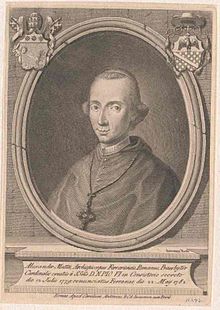Alessandro Mattei
Appearance
This article needs additional citations for verification. (January 2017) |
Alessandro Mattei | |
|---|---|
| Cardinal-Bishop of Ostia e Velletri | |
 | |
| See | Ostia e Velletri |
| Appointed | 26 September 1814 |
| Term ended | 20 April 1820 |
| Predecessor | Leonardo Antonelli |
| Successor | Giulio Maria della Somaglia |
| Other post(s) | Archpriest of Saint Peter's Basilica |
| Previous post(s) |
|
| Orders | |
| Ordination | 27 February 1768 |
| Consecration | 23 February 1777 by Bernardino Giraud |
| Created cardinal | 12 July 1779 |
| Rank | Cardinal-Bishop |
| Personal details | |
| Born | 20 February 1744 |
| Died | 20 April 1820 (aged 76) |
| Denomination | Roman Catholic |
Alessandro Mattei (20 February 1744, Rome – 20 April 1820) was an Italian Cardinal, and a significant figure in papal diplomacy of the Napoleonic period. He was from the Roman aristocratic House of Mattei.
He became Archbishop of Ferrara in 1777, and was named cardinal in 1779.
He became Bishop of Palestrina in 1800, Bishop of Porto-Santa Rufina in 1809, and Bishop of Ostia in 1814.[1] From 1817 to his death he was archpriest of St Peter's Basilica.
Episcopal succession
[edit]
Ordination history of Alessandro Mattei | |||||||
|---|---|---|---|---|---|---|---|
| |||||||
| |||||||
Cardinal Bernardino Giraud consecrated Mattei to the episcopacy on 23 February 1777. Having himself consecrated Pietro Francesco Galleffi to the episcopacy, Cardinal Mattei is in the episcopal lineage of Pope Francis.[2]
Notes
[edit]- ^ Vescovi diocesani Archived 2006-05-18 at the Wayback Machine
- ^ Profile of Pope Francis at Catholic Hierarchy.org [importance?]
External links
[edit]You can help expand this article with text translated from the corresponding article in Italian. (March 2013) Click [show] for important translation instructions.
|
You can help expand this article with text translated from the corresponding article in Portuguese. (March 2013) Click [show] for important translation instructions.
|
You can help expand this article with text translated from the corresponding article in French. (March 2013) Click [show] for important translation instructions.
|
Categories:
- 1744 births
- 1820 deaths
- House of Mattei
- 19th-century Italian cardinals
- Roman Catholic archbishops in Italy
- Bishops of Ferrara
- Clergy from Rome
- Cardinal-bishops of Ostia
- Cardinal-bishops of Palestrina
- Cardinal-bishops of Porto
- Deans of the College of Cardinals
- Papal chamberlains
- 18th-century Italian cardinals
- 18th-century Italian Roman Catholic archbishops
- Italian cardinal stubs

